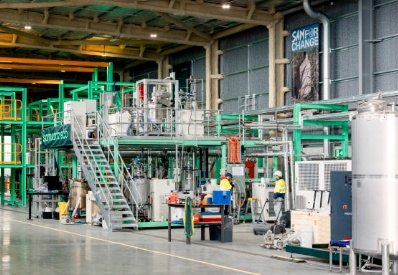Australia's First Enzymatic Recycling Plant Established, Exploring the Secret to Infinite Plastic Regeneration
With the completion of the first enzymatic recycling plant by Australia's Samsara Eco, PKN delved into how enzyme-based technology works, why it is significant for the packaging industry, and where it will lead the industry.
Enzymatic recycling is a biotechnological process that uses specially designed enzymes to break down plastics into their original chemical building blocks. Unlike mechanical recycling—which involves shredding, melting, and remolding plastics but often degrades material quality—enzymatic processes can restore plastics to the same state as the original monomers. These monomers can then be repolymerized to produce new plastics with the same strength, performance, and safety as those made from fossil fuels.

This means that packaging materials once considered "single-use" can be repeatedly recycled without loss of quality, thus coming closer to a truly circular system.
Traditional recycling methods have long been hindered by issues such as contamination, color, and material complexity, which is why much plastic ultimately ends up in landfills or incinerators. Enzymatic recycling, however, bypasses these limitations. This process is highly versatile, capable of handling mixed plastic streams, colored plastics, and multilayer packaging. The products it generates are indistinguishable from virgin plastics, thus avoiding the problem of downcycling. Moreover, since enzyme production can be scaled up for industrial use, this technology has the potential for large-scale commercial application.
For packaging manufacturers, enzymatic recycling offers a pathway to meet increasingly stringent sustainability requirements, including mandatory recycled content and Extended Producer Responsibility (EPR) programs. Flexible packaging—such as films, pouches, and sachets—is a particular focus. These packaging formats are lightweight and resource-efficient but pose significant challenges for recycling.
Enzymatic hydrolysis technology can break them down at the molecular level, producing high-quality recycled polymers that can be reused for packaging production without compromising performance or food safety.
With the completion of Samsara Eco Company's factory in Jerrabomberra, Australia is standing at the forefront of a new generation of recycling technologies. Samsara's AI-designed EosEco enzyme can process various plastics, including Nylon 6,6 and polyester. While the first commercial products will target the textile sector, this technology is also designed for packaging applications.
Currently, the company has partnered with multiple brands to accelerate market expansion. By integrating recycled monomers into the existing supply chain, Samsara aims to make it easy for manufacturers to replace virgin plastics with circular alternatives.
Enzymatic recycling is attracting significant investments worldwide, with startups, academic groups, and established recyclers all racing to scale up. Analysts predict that over the next decade, enzymatic plants will join mechanical and chemical recycling as core pillars of the global plastic circular economy.
If this technology succeeds, it will revolutionize the recycling economy—transforming plastic waste from a costly burden into a renewable resource with an almost infinite lifecycle.
【Copyright and Disclaimer】The above information is collected and organized by PlastMatch. The copyright belongs to the original author. This article is reprinted for the purpose of providing more information, and it does not imply that PlastMatch endorses the views expressed in the article or guarantees its accuracy. If there are any errors in the source attribution or if your legitimate rights have been infringed, please contact us, and we will promptly correct or remove the content. If other media, websites, or individuals use the aforementioned content, they must clearly indicate the original source and origin of the work and assume legal responsibility on their own.
Most Popular
-

Key Players: The 10 Most Critical Publicly Listed Companies in Solid-State Battery Raw Materials
-

Vioneo Abandons €1.5 Billion Antwerp Project, First Commercial Green Polyolefin Plant Relocates to China
-

EU Changes ELV Regulation Again: Recycled Plastic Content Dispute and Exclusion of Bio-Based Plastics
-

Clariant's CATOFIN™ Catalyst and CLARITY™ Platform Drive Dual-Engine Performance
-

List Released! Mexico Announces 50% Tariff On 1,371 China Product Categories






